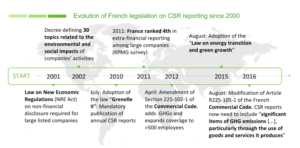Corporate Social Responsibility (CSR) reporting is mandatory in France for publicly listed and non-listed companies with at least 500 employees and a minimum of 100 million Euros turnover. While this has not changed, the information to be declared by companies has now become more comprehensive: Since the new Decree of 19th August 2016, important direct (Scope 1) and indirect (Scope 2 and 3) GHG emissions linked to the supply chain will have to be declared, covering both upstream and downstream emissions. The decree has modified Article R225-105-1 of the French Code of Commerce by applying the “Law on energy transition and green growth” which entered into force in 2015 (see timeline). The new version now requires the Board of Directors or the Management Board to mention additional information concerning the relevance of its activities for climate change in their CSR reports: “Significant items of GHG emissions caused by the company’s activity, particularly through the use of goods and services it produces” need to be addressed.
Upstream emissions reporting: From scope 1 to scope 3 – Even though they represent more than three quarters of GHG emissions in many industry sectors, indirect emissions occurring along the supply chain are often underestimated in terms of their contribution to overall (life cycle) GHG emissions of products and services. With the new modification, French government has taken an important first step toward supply chain emissions reporting. This example demonstrates how governments can use national laws to rally the private sector community – not only locally or within their operations, but to harness their influence on global supply chains as a key lever in making a global impact on climate change. Working with the private sector will be essential for governments to accelerate their sustainability ambitions and fulfill their COP21 commitments. Although the demand is still somewhat vague about what information needs to be included in CSR reports, legal and stakeholder pressure on companies to increase transparency is bound to further rise. Nonetheless, companies still lack solid methodological guidance on how to measure and reduce emissions beyond their own operations.

Figure 1: Timeline of French laws on GHG emissions
How to assess suppliers’ GHG emissions? – For companies concerned by the evolution of French law, as well as to those who wish to drive sustainable procurement with an emphasis on their climate change impact, EcoVadis offers comprehensive CSR assessments of their suppliers: The methodology integrates GHG emissions of suppliers by examining, among other things, their policies and reporting practices on this topic. While best practice for emissions policies is to communicate clear principles and objectives for the reduction of GHG emissions in qualitative and quantitative terms, reporting of Key performance indicators (KPIs) can have an even stronger, positive impact on a suppliers’ scorecard. KPIs can be provided by suppliers through the questionnaire along with respective documentation, e.g. CSR reports, or with the help of EcoVadis’ partnership with Carbon Disclosure Project (CDP), whose reports are directly taken into account if a supplier is registered. Furthermore, a separate KPI module dedicated to direct and indirect GHG emissions provide another option to suppliers to share their latest metrics with their clients and can be updated from year to year.
Reporting of GHG emissions completes the picture of suppliers’ CSR management practices provided by EcoVadis through its in-depth analysis of not only environmental, but also social and ethical criteria. Given the recent changes of legal requirements in France, and moreover from a strategic perspective, buyers who make use of such integrated solutions for CSR assessments are able to distinguish themselves as leaders in promoting more transparency along global value chains.
Read our latest blogs:
Are You Ready For Supply Chain Sustainability Reporting requirements?

